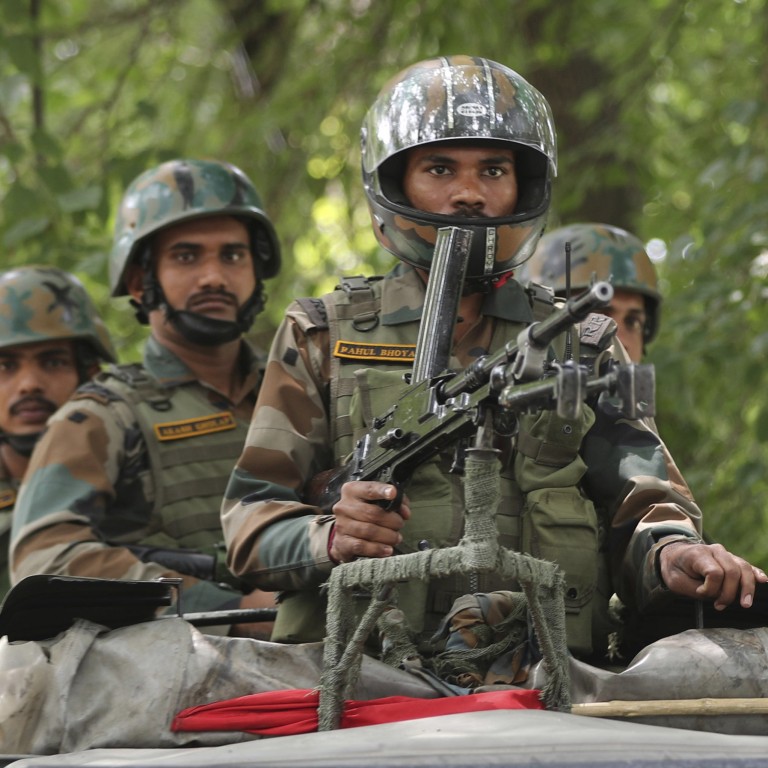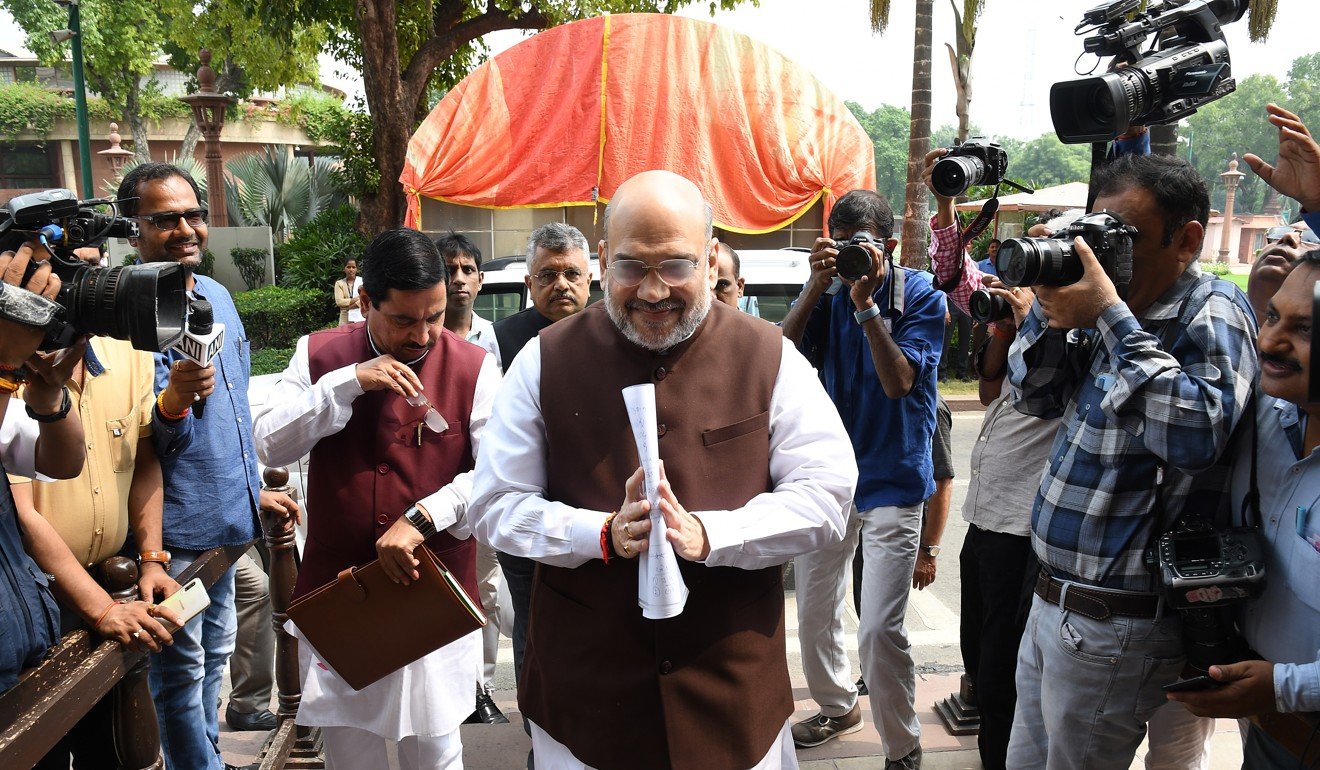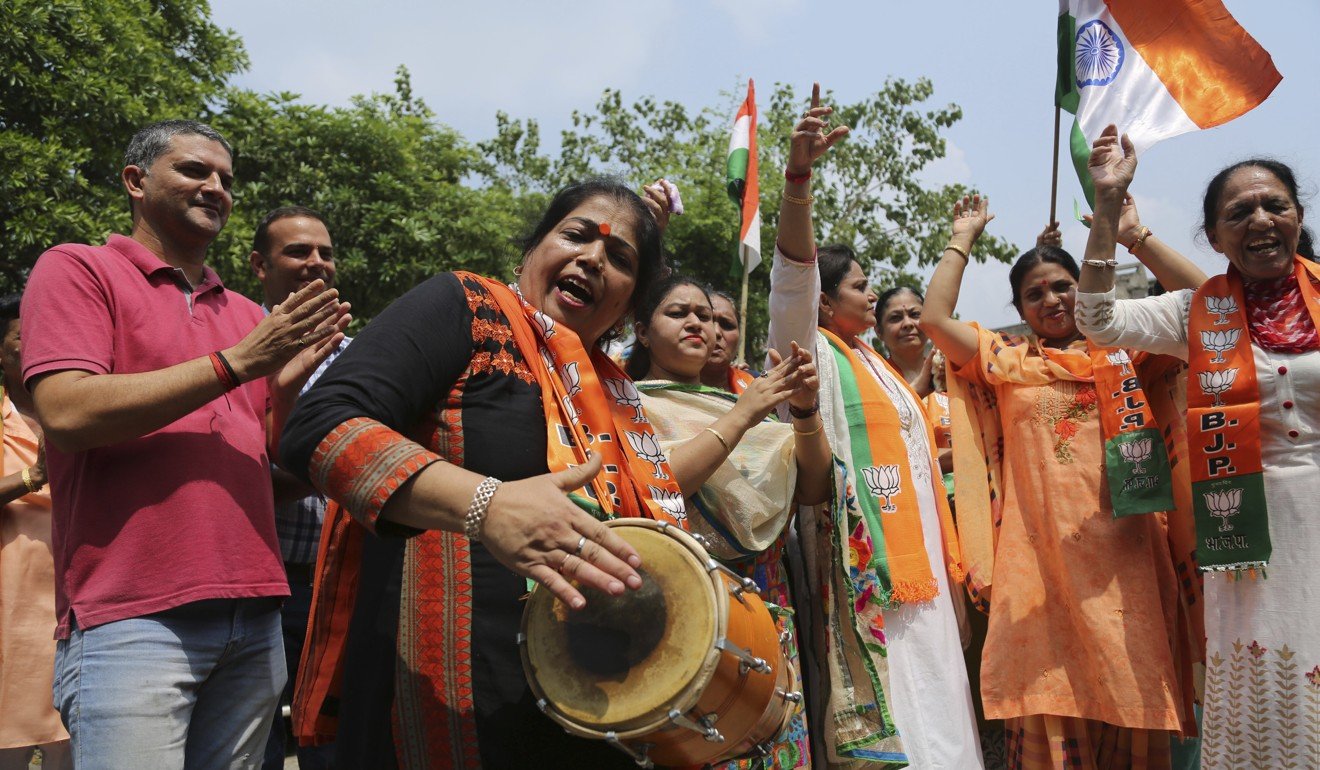
India’s dispute with Pakistan over Jammu & Kashmir has a loser – New Delhi’s cherished secularism
- Hindu nationalists have long railed against the ‘special privileges’ accorded to India’s only Muslim-majority state
- But while India holds that religion cannot be an organising principle, its actions in its northernmost province belie that, writes Ajai Shukla
This special relationship with J&K was enshrined in Article 370 of the Indian constitution.
This has long irked Hindu nationalists, who for decades railed against “special privileges” being accorded to India’s only Muslim-majority state and, especially, against Article 370.
Last May, with an increasingly right-leaning Indian electorate voting Modi back to power with an increased majority in Parliament, the fate of Article 370 was sealed.
Even so, there is surprise in many quarters at how emphatically the government has acted. Last year, the BJP pulled out of the coalition government in Kashmir. That left its partner, Mehbooba Mufti’s People’s Democratic Party (PDP), in a minority – paving the way for her dismissal and the imposition of central rule.
With New Delhi ruling the state through a governor in Srinagar, tens of thousands of central police forces were pumped into Kashmir over the last fortnight, beefing up the estimated 400,000 or so troops already based there.
Last week, the Amarnath Yatra – a hallowed annual pilgrimage by Hindu devotees from all over India to a Himalayan shrine in Kashmir – was abruptly called off and tens of thousands of pilgrims and tourists were bundled out of Kashmir.
New Delhi’s move will inevitably face legal, constitutional and political challenges; not just from Kashmiri groups but also from civil society groups in India.
On Sunday, curfew was imposed all across the Kashmir Valley, and the internet was cut off. Kashmiri politicians, including “pro-India” politicians like Mufti, were put under arrest, lumping all Kashmiris – loyalists, nationalists and secessionists – together, damaging invaluable relationships beyond repair.
Amid wild rumourmongering all through that day, panicked Kashmiris stocked up for a lengthy siege.
On Monday morning, their worst fears unfolded. Home affairs minister Amit Shah announced in Parliament that the BJP-supported President of India, Ram Nath Kovind, had signed an order making J&K subject to the Constitution of India, effectively quashing Article 370.
India scraps Kashmir’s special status raising fears of ‘catastrophic’ unrest
Such an abrogation, according to the article’s own provisions, demands consultation with the state assembly. But with that assembly suspended and J&K under central rule, the presidential order stated that consultation with the New Delhi-appointed state governor would suffice.
Ironically, the governor had publicly promised just days ago that no constitutional changes were on the cards.
In an even more radical move, Shah dealt with the J&K problem by terminating the existence of the entity, bifurcating the state into two territories that are part of the Indian union.
The vast Ladakh region, sparsely inhabited by Buddhists and Shia Muslims, which had remained largely peaceful through three decades of insurgency in Kashmir, would henceforth be centrally administered from New Delhi.

The second union territory would comprise of the Jammu region and of Kashmir, and would have an elected assembly.
There is no telling, though, when that assembly would be constituted; J&K state elections have been pending since the Mufti government fell in June 2018, but have been postponed for “security reasons”.
It is likely that New Delhi will continue to put off elections for the foreseeable future, choosing instead to deal with the restive Kashmir region indefinitely without the moderating influence (read, nuisance) of an elected state assembly.
That could change once the BJP orchestrates the delimitation of electoral constituencies to allocate a larger number of seats to Hindu-majority areas.
Thousands of visitors flee Kashmir, while India-Pakistan tensions flare
Kashmiri outrage at these unilateral changes is inevitable. Former J&K chief minister Omar Abdullah termed the scrapping of Article 370 a “total betrayal of trust” that amounted to “aggression”. Mufti denounced this as “the darkest day in Indian democracy”.
However, the fulminations of mainstream politicians are now far less important than the reaction of the Kashmiri street.
Over the preceding decade, the secessionist leadership has passed from Pakistan-controlled individuals like the octogenarian Syed Yusuf Shah Geelani into the hands of disparate, hot-blooded young chiefs, including some with ties to al-Qaeda and Islamic State.
If street protests erupt and gain traction, Kashmir could be in for another bloody summer. For that reason, security forces have been ordered to make sure the streets remain empty.

India’s security managers are comfortable with battling armed Kashmiri militants and have, over the decades, fine-tuned an operational and intelligence grid that takes out militants as fast as Kashmiri youths can be persuaded to pick up the gun, or Pakistan can send them across the Line of Control.
However, tackling stone-pelting mobs of unarmed youngsters is less to the liking of troops and policemen in Kashmir.
In an international community where there is little tolerance for Islamist jihadis, gunning down armed fighters carries little opprobrium. However, the image-conscious Indian military realises the potential for criticism in dealing with a Kashmiri intifada.
New Delhi’s move will inevitably face legal, constitutional and political challenges; not just from Kashmiri groups but also from civil society groups in India.
Modi asked to step in as India erupts in fury over Trump’s Kashmir mediation claims
Much will depend upon whether the courts determine that changing the constitutional nature of New Delhi’s relationship with Kashmir changes the basic structure of the Indian constitution.
An opposition in disarray is unlikely to mount a serious political challenge, especially with several parties flirting with Hindu politics themselves.
So far, no country except Pakistan has criticised India. Islamabad has threatened it “will exercise all possible options to counter [India’s] illegal steps”.
However, Islamabad long ago took its own illegal steps in the part of Kashmir that it controls, designating Gilgit-Baltistan (which it called the Northern Areas) a federally administered area.
Abolishing Kashmir’s special status is ‘illegal’, Pakistan says
Indians have always held up Kashmir’s accession as a repudiation of the two-nation theory, based on which Pakistan was carved out of India’s Muslim-majority areas.
The two-nation theory viewed Hindus and Muslims as two distinct nations, holding that a Muslim minority could never be safe in a Hindu-majority India.
India, however, holds that religion cannot be an organising principle, and the secure existence of Muslim-majority J&K in India validates the country’s cherished secularism. After bulldozing down the special protections guaranteed to J&K, New Delhi will find that argument a little harder to make.
A former Indian Army colonel, Ajai Shukla is an analyst and commentator on defence and security affairs

